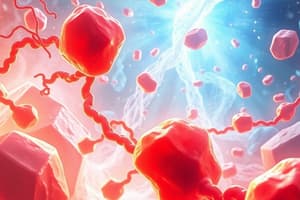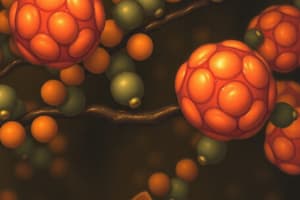Podcast
Questions and Answers
Which of the following factors is NOT an established modifiable risk factor for cardiovascular disease?
Which of the following factors is NOT an established modifiable risk factor for cardiovascular disease?
- Hyperlipidaemia
- Age (correct)
- Cigarette smoking
- Hypertension
What enzyme catalyzes the rate-limiting step in cholesterol synthesis?
What enzyme catalyzes the rate-limiting step in cholesterol synthesis?
- Citrate lyase
- Acetyl-CoA carboxylase
- Cholesterol esterase
- HMG-CoA reductase (correct)
Which statement correctly describes the role of cholesterol in the body?
Which statement correctly describes the role of cholesterol in the body?
- Cholesterol is a structural component of cell membranes and a precursor for steroid hormones. (correct)
- Cholesterol is solely an energy source stored in adipose tissue.
- Cholesterol can be easily broken down and utilized for energy.
- Cholesterol serves only as a precursor for bile acids.
What happens to cholesterol when it is not utilized in the body?
What happens to cholesterol when it is not utilized in the body?
Which lipoproteins are primarily involved in transporting cholesterol in the plasma?
Which lipoproteins are primarily involved in transporting cholesterol in the plasma?
What role does β-hydroxyl-β methyl glutaryl coenzyme A reductase (HMG COA reductase) play in cholesterol metabolism?
What role does β-hydroxyl-β methyl glutaryl coenzyme A reductase (HMG COA reductase) play in cholesterol metabolism?
Which of the following statements about plasma triglycerides is true?
Which of the following statements about plasma triglycerides is true?
What feedback mechanism regulates HMG COA reductase activity?
What feedback mechanism regulates HMG COA reductase activity?
How do fatty acids function within the body in relation to energy metabolism?
How do fatty acids function within the body in relation to energy metabolism?
What is the primary difference between exogenous and endogenous triglyceride synthesis?
What is the primary difference between exogenous and endogenous triglyceride synthesis?
Flashcards are hidden until you start studying
Study Notes
Cholesterol Metabolism
- β-Hydroxy-β-methylglutaryl coenzyme A reductase (HMG-CoA reductase) serves as the rate-limiting enzyme in cholesterol synthesis.
- Enzyme activity is regulated by intracellular cholesterol levels through a negative feedback mechanism.
- Approximately two-thirds of plasma cholesterol exists as esterified forms (cholesterol esters).
- Plasma cholesterol concentration does not increase right after meals, unlike triglycerides.
Triglycerides
- Composed of fatty acid esters of glycerol; primary lipids in the diet.
- Broken down in the small intestine into monoglycerides, fatty acids, and glycerol, which are then absorbed and resynthesized into triglycerides within mucosal cells.
- Exogenous triglycerides enter plasma as chylomicrons, while endogenous triglycerides are synthesized in the liver and transported as very low-density lipoproteins (VLDL).
- Plasma triglyceride levels rise post fatty meals and remain elevated for hours.
Fatty Acids
- Can be derived from dietary or tissue triglycerides; body synthesizes most, except certain essential fatty acids.
- Serve as an alternative energy source to glucose.
- Exist as straight-chain carbon compounds, categorized as saturated, mono, or polyunsaturated.
Cardiovascular Risk Factors
- Lipid metabolism is crucial in assessing cardiovascular disease risk.
- Non-modifiable factors: family history, age, pre-existing vascular disease.
- Modifiable factors: smoking, hypertension, diabetes, hyperlipidaemias (especially hypercholesterolaemia).
Lipids Overview
- Include cholesterol, triglycerides, fatty acids, and phospholipids; crucial for energy storage, structural cell components, and specialized functions.
- Primarily insoluble in water, transported in plasma with proteins as lipoproteins.
Cholesterol Details
- Present in diet but primarily synthesized in the liver and small intestine; regulated by HMG-CoA reductase.
- Major cell membrane component, precursor for adrenal and gonadal steroid hormones.
- Mainly found as esterified cholesterol; cannot be broken down, hence is excreted or converted to bile acids for excretion.
- Cholesterol synthesis starts from acetate and proceeds through mevalonic acid.
Apolipoproteins
- ApoB exists as apoB100 (found in LDL, chylomicrons, VLDL, IDL) and apoB48 (exclusive to chylomicrons).
- ApoC proteins (C-I, C-II, C-III) synthesized in the liver and incorporated into HDL.
- ApoE aids in hepatic uptake of chylomicron remnants and IDL; has three major isoforms (E2, E3, E4) with multiple genotypes.
- Apo(a) correlates inversely with Lp(a) size and plasma concentration.
Functions of Apolipoproteins
- Apo A-I & A-II: Activates lecithin-cholesterol acyltransferase (LCAT) in chylomicrons and HDL.
- Apo B-48: Facilitates secretion of chylomicrons and VLDL.
- Apo B-100: Binds LDL receptors in IDL, VLDL, LDL.
- Apo C-II & C-III: Activates lipoprotein lipase in chylomicrons, HDL, VLDL, IDL.
- Apo E: Connects to receptors on IDL and remnant particles.
Studying That Suits You
Use AI to generate personalized quizzes and flashcards to suit your learning preferences.




